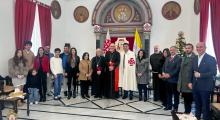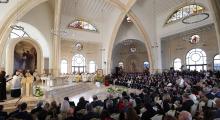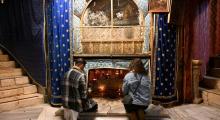Issued by the Catholic Center for Studies and Media - Jordan. Editor-in-chief Fr. Rif'at Bader - موقع أبونا abouna.org

Following is the meditation of Latin Patriarch of Jerusalem His Beatitude Pierbattista Pizzaballa for the First Sunday of Lent, Year B, February 21, 2021:
In the Gospel of Mark, the account of Jesus’ temptations in the desert occupies a small space of only two verses (Mk 1:12-13). Mark does not relate the content of the temptations, nor does he tell how many they were; and – a very important detail – he does not even say how Jesus overcame them. It appears that Mark values and considers important only the idea that Jesus has been put to the test.
Jesus has just experienced the intense reality of baptism when he heard the voice of the Father Who called Him “Beloved Son” (Mk 1:9-11). Today’s Gospel tells us that the very Spirit that descended on Him in the baptism now drives Him into the desert, where Jesus learns at least two important things in life.
In the desert, Jesus learns first of all that there is not only the voice of the Father. Next to the Father’s voice, as happened at the beginning with Adam and Eve, there is another voice, which speaks of another possible way. And they are two very different voices: where the Father speaks of sacrifice, the other speaks of self-fulfillment; where the Father speaks of humble service, the other speaks of power and success.
So, Jesus learns that within the circumstances of life He must choose who to listen to, by which voice He lets Himself be led, which path to follow, who to trust. Throughout life, Jesus must know how to distinguish the one voice from the other, to know the way of life, just like Israel in the years of the desert journey, to learn to be free. It will be a matter of making it His own, of interiorizing the Father’s Will, His preference, until He makes it become His own, even when it will cost life.
And in the desert, then, Jesus learns what it means to be “son,” that is, what it means to be free.
To be sons means, necessarily, to be tested. A servant is not tested, he doesn’t have to choose: he can only obey. The son, instead, can and must choose: if he does not choose the Father, he becomes a servant. And choosing involves doubt, disturbance, prayer, remembrance, discernment. Jesus is not spared anything of this experience, like each of us.
For Mark, therefore, it is not so much to unveil the three possible lusts hidden within life’s choices. Rather, it is to understand that life is also a trial, a struggle, not only at a given moment, but at every instant.
The Will of God, indeed, does not impose itself but asks to be chosen, to be loved. And there is no love that does not pass through concrete choices: to love means to prefer. Like every man, Jesus must decide, and every decision will be a battle. And this not once and for all: the initial choice is not enough, but we must always prefer, and in a new way, in the new situations that life presents.
We have stated that Mark, unlike the other Synoptics, does not specify what the temptations are, nor how Jesus overcame them. Rather, he highlights the existence of a life lived in obedience to the Father, a life that chooses to listen to the voice that calls us sons: Jesus “was with the wild beasts and the angels ministered to Him” (Mk 1:13).
To understand the significance of this picture, the Book of Daniel comes to our aid. In the account of the prophet’s life, we see that, at a certain point, Daniel and his companions are tested. Indeed, whoever addressed petitions to other gods or men other than King Darius was put to death. Daniel and his companions, called to choose who to listen to, who to entrust their life, as sons, choose the Father and therefore are cast, the first time, into the fire (Dan 3), the second time as food to the lions (Dan 6). But neither the fire nor the lions touch the life of the prophet Daniel and his companions; these powers of death do not have any power over them, to the extent that Daniel and his companions can praise God, while an angel stands next to them in the furnace (Dan 3:49,92).
Thus, a trial of man becomes also a trial of God, to demonstrate that God does not abandon those who trust with all their heart. So, after leaving the desert, Jesus can announce that truly time is fulfilled and the Reign of God is at hand (Mk 1:15).
+Pierbattista







